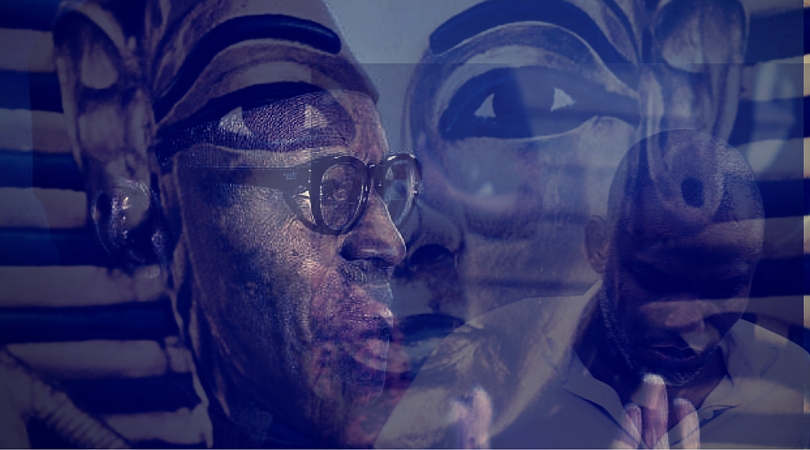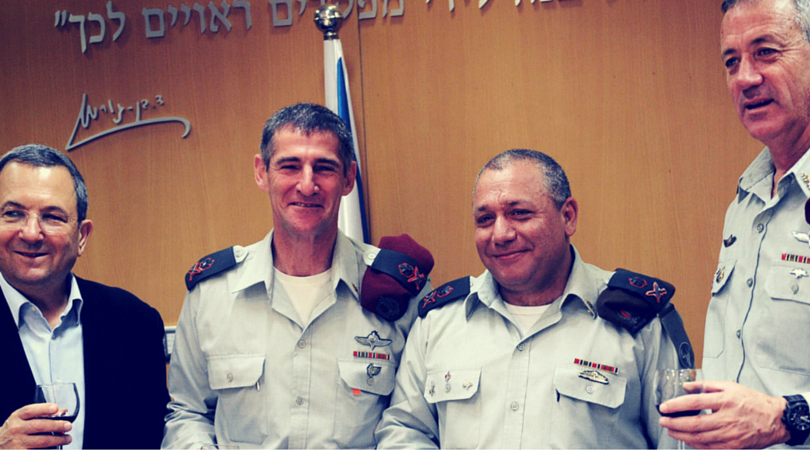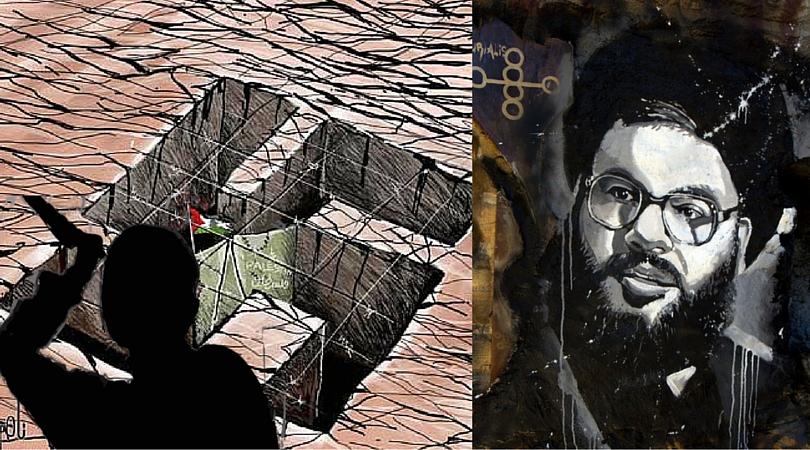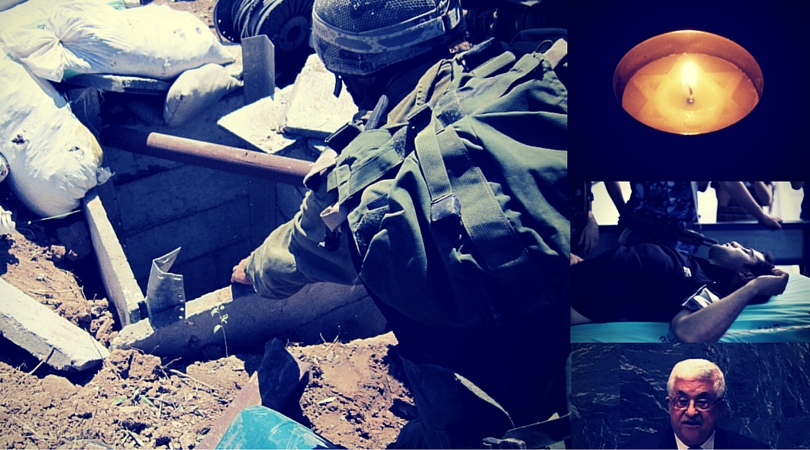Throughout history and in all regions of the world where there has been genuine and honest response to the crime of genocide, separation has always been the only sensible response.
Like Manna From Heaven – For Israel’s Detractors
“Israel has been infected by the seeds of fascism …There are no serious leaders left in the world who believe the Israeli government.” – Former PM, Ehud Barak, Channel 10, May 20.
“Today we have a country afflicted with ultra-nationalistic extremism, infected with the seeds of fascism and chauvinism.” –Head of opposition, Isaac Herzog, Knesset, May 23.
“Israel has truly become today the last bastion of fascism, colonialism and racial discrimination in the world.” – Nabil al-Arabi Secretary-General of the Arab League, Cairo May 28.
“I fought with all my might against the phenomena of extremism, violence and racism in Israeli society that are threatening our national resilience and are seeping into the Israel Defense Forces; in fact already harming it… But to my great regret, extremist and dangerous forces have taken over Israel and the Likud party.” – Former defense minister Moshe “Bogie” Yaalon, Resignation speech, May 20.
“Today Israel is suffering a process of ongoing radicalization and increasing extremism, which has brought criticism from senior Israelis against their government. They all say that Israel behaves in a fascist and racist manner. They say so. Like the deputy chief of staff of the IDF said ‘Our behavior is reminiscent of the behavior of the Nazis prior to WW II.’”– Mahmoud Abbas, Head of the Palestinian Authority, Cairo, May 28.
May was a very good month for the myriad of eager Israel-bashers across the globe.
Beyond wildest Judeophobic dreams
With no effort on their part, the recent rash of stupid, ill-considered — and gravely misleading — public proclamations provided them with more to bash Israel with than they could have wished in their wildest Judeophobic dreams.
What more could they have hoped for? Some of the most senior figures in the Israeli establishment have now publicly corroborated precisely what they have been trying to convey in their toxic tirades against the Jewish state for years. Now they have it on the best of authority — straight from the horse’s mouth, so to speak:
The Jewish state is a fascist, racist entity — indeed, one of an evil kind in today’s world.
Who could argue with them now? Israel is descending inexorably in to the lowest depth of human depravity comparable to the darkest times humanity has known in modern history.
Indeed, they need not even make these horrific accusations themselves — and expose themselves to charges of antisemitism. All they need do is quote the vitriolic condemnation of Israel by its own political and military leadership. And if they embellish or distort them slightly — who would notice, or even care enough to wrangle over details. After all, when the principle has been made so indelibly clear, who has time for splitting fascist hairs?
Abominable analogy
The point of departure for this deplorable and distortive portrayal of Israel can be traced to the abominable analogy made by the IDF’s deputy chief of staff, Maj-Gen. Yair Golan at a Holocaust commemoration ceremony on May 4. Golan suggested — or, at least, could plausibly have been interpreted by Israel’s fiercest detractors as suggesting — that Israel is undergoing a process reminiscent of those that heralded the advent of fascism and the rise of Nazism in Europe in the 1930s. He proclaimed: “If there’s something that frightens me about Holocaust remembrance it’s the identification of the horrific processes that occurred in Europe in general, and particularly in Germany, back then…and detecting signs of them here among us today in 2016.”
It matters not whether that such a parallel was his intention or not. Once the anti-Israel cohorts could spin it that way, it took on a life of its own.
But Golan went on further, painting — or giving Israel-bashers the opportunity of painting — a grossly distorted picture of the emerging trends in Israeli society. He pontificated: “There is nothing easier than hating the “other”, nothing easier than fear-mongering and instilling panic. There is nothing easier than to adopt callous, thick-skinned bestiality and holier than thou self-righteousness.”
Irrelevant and unrepresentative rebuke
This apparent rebuke raises two issues. Firstly, if Golan chose to articulate it, he clearly must believe that the objectionable features he mentions, comprise a significant trend in Israeli society. Otherwise why bring it up — especially in a Holocaust commemoration speech? But if they are not, it is a rebuke that is totally irrelevant.
Secondly, if Golan feels that these features do represent significant propensities he is hopelessly out of touch with the dominant characteristics of Israeli society — and his implied rebuke is wildly unrepresentative.
Perhaps he missed the wide coverage of Israeli humanitarian missions to disaster areas such a Haiti and Nepal among a host of other afflicted countries to which Israel extends aid. Hardly indicative of “callous thick-skinned bestiality.”
Other things might have slipped his mind, like the extensive medical treatment provided to casualties of the gruesome civil war in Syria. Or the hospital services given to the family members of Israel’s sworn enemy, Hamas — including those of its leader in Gaza, Ismail Haniyeh. Indeed, Haniyeh’s own mother-in-law, grand-daughter and daughter were all admitted to Israeli medical facilities in 2013-14, the latter “just weeks after a 50-day war [Protective Edge] between Israel and the Palestinian Islamist movement” (The Telegraph, October 20, 2014). OMG – just how much “hate for the ‘other’” can a country harbor!
“Providing weapons to Hamas propaganda…”
Perhaps one of the better gauges of just how damaging Golan’s remarks — and those of others that followed them — were to Israel, is an interview with journalist, Ben-Dror Yemini, on Tel Aviv Radio (May 4). For the record, Yemini is a left-leaning publicist and self-confessed supporter of Herzog’s left of center Zionist Union in the last election.
At the outset of the interview, Yemini described Golan’s abhorrent allusion as an “appalling mistake” especially for anyone who has any idea of ongoing developments regarding Israel in the world. He went on to remind listeners that Israel was fighting “on two fronts, and today the PR front is no less important than the military front”
He lamented: “To compare Israel to Nazi Germany reflects a kind of insanity that, regrettably, is beginning to dominate us…If the deputy leader of the British Labor party…who we accuse of antisemiticsm …had have said that, he would have been thrown out of the party.”
With evident bitterness, Yemini claimed: We are providing weapons for the Hamas’s propaganda…I have been engaged in a world-wide effort to repudiate the false accusations against Israel, and suddenly someone like [Golan] comes along and ruins years of work.
Greatly agitated, Yemini continued: “Anyone who compares Israel to the Nazis is not someone who usually wants to criticize Israel. It is someone who does not want Israel at all!…Moreover it is all a lie! But when he [Golan] says it, it gives them a boost. The whole social network is abuzz. All the anti-Israel and antsemitic sites have made him a hero”.
“As damaging as a terror attack…”
With a touch of drama, Yemini informed the interviewer: “I was in Auschwitz, at a conference on the Nuremberg Trials, when I heard Golan’s remarks. I was there! Right there! I spoke with some of the participants, who were not right-wing people. The general perception was this [Golan’s speech] was equivalent to a terror attack. No less!…”
Still greatly troubled, Yemini penned an article five days later entitled “A PR terror attack” (Ynet, May 9). In it, he strongly refuted any slide toward large-scale fascism or racism in Israel, which despite the grave threats to its existence, still compares favorably, in terms of the liberalism and tolerance, to other European democracies. By way of comparison he cites Sweden, often a vehement critic of Israel, where “dozens of refugee centers were burnt” and “polls show up to 15% backing for a party representing neo-Nazi supporters.”
True, like any other society, Israel has its blemishes. There are instances of hooliganism, social intolerance and even ethnic bias. But there are no politicized movements of any significance, and certainly none with any electoral prospects, that promote doctrines of racial superiority or promulgate the principles of fascism.
Accordingly to suggest that Israel is in anyway afflicted with the seeds of fascism is not criticism. It is indeed as Yemini states, a blood libel.
Hollow ring to cries of dismay
Any allusion by any Israeli of prominence that any such phenomena exist, betrays not only a poor grasp of the socio-cultural realities in the country, but also raises grave questions as to his/her motivations and/or quality of judgement.
Of course the chorus for dismayed voices warning of the impending advent of fascism/racism/extremism was amplified in the wake of the Golan address by the replacement of Moshe Ya’alon as defense minister by Avigdor Lieberman.
Admittedly, I have serious reservations as to what to expect from Lieberman, and as to the rationale for appointing him to such a crucial post in the wake of what was a devastating electoral failure at the polls last year (with his faction diminished by over half and reduced even further by his most prominent MK — Orly Levy — quitting the party). However, that said, the distraught cries by many of his detractors as to the danger he poses to Israeli democracy, have a decidedly hollow ring to them.
Indeed, many of his current critics have, in fact, served with him in governments in the past, without expressing undue alarm as to the grave threat he posed to Israeli democracy — even when his electoral success was far greater. Indeed, Lieberman has served, including as deputy prime minister, in every government since 2001, when Arik Sharon wrested power from Ehud Barak.
It is thus difficult to avoid the impression that the current deluge of opprobrium for him is motivated more by political and personal chagrin than any real genuine concern for the future of democratic governance in Israel.
Tolerating terror as anti-fascist litmus test
Take for example Ehud Barak, who served as deputy prime minister together with Lieberman both in Ehud Olmert’s government (2006-9) and in Netanyahu’s (2009-13), with nary a concern expressed for Israeli democracy.
In his Channel 10 diatribe (see opening except), Barak sought to illustrate his point regarding the “seeds of fascism” taking hold in Israeli society by referring to legislation promoted by members of the current coalition. Among these allegedly “egregious” undemocratic initiatives was the law to lift the parliamentary immunity of Knesset members who support terrorism (Haaretz, May 20).
This of course leads one to wonder whether, according to Barak, the litmus test of democratic governance is giving elected legislators in the national parliament license to support terror organizations, dedicated to the destruction of the society that that parliament represents, secure in the knowledge that they will be immune from any punitive action.
Apparently in Barak’s eyes, for a country to avoid being afflicted by the “seeds of fascism”, it must give priority to the rights of legislators to support terror over the rights of intended victims of that terror to life.
This is, of course, an “interesting” perspective and one that might explain why in the past Barak proclaimed that, if he had been a Palestinian, he too would have engaged in terror.
Isaiah 49:17
The howls of dismay at the approaching demise of Israeli democracy are utterly unfounded and uncalled for.
When they come from highly-placed Israelis, who put short-term personal and political interest before the long term national one, they inflict incalculable, perhaps irrevocable harm on the country, inevitably compelling us to recall the words of Isaiah 49:17
“Thy destroyers and thy demolishers shall emerge from within thee. “
So it would seem.
Headlines: Stabbing Attack, Earthquake, Iran Holocaust Denial Cartoon Contest
One man wounded after stabbing attack along Hanevi’im Street in Jerusalem. Arab terrorist arrested.
[Arutz Sheva]
Light earthquake measuring 4.8 hits southern Israel; No injuries reported.
[The Jerusalem Post]
Iran mocks the Holocaust by staging a Nazi-themed cartoon contest, as Israeli prime minister claims the Islamic Republic is ‘preparing another genocide’
[Daily Mail]
The planned French international peace initiative will take place without Israeli or Palestinian Authority participation.
[The Jewish press]
Nasrallah: We must be vigilant against the ‘Zionists’. Hezbollah leader warns of Israel’s moves in the region, calls for vigilance.
[Arutz Sheva]
Two suspects have been arrested and are still being questioned for the Hizme checkpoint bombing earlier this month.
[The Jewish press]
Headlines: Ceasefire / Holocaust Remembrance / Terror Tunnels
Egypt brokers a ceasefire between Israel and Hamas after clashes between both sides began after Hamas fired mortar shells at IDF positions near the Gaza border. The IDF has been performing operations near the Gaza border exposing terror tunnels that Hamas builds in order to infiltrate Israel and attack civilians.
[Jerusalem Post]
The IDF has uncovered a second terror tunnel from Gaza into southern Israel, mere weeks after a previous tunnel was exposed and destroyed.
[Arutz Sheva]
Israel pauses to remember millions murdered in Holocaust. Air raid siren brings country to a standstill for 2 minutes as dignitaries prepare to mark Shoah Remembrance Day.
[Times of Israel]
The bodies of the eastern Jerusalem terrorists who committed recent attacks in Israel will be returned to their families, the High Court ruled on Thursday.
[Arutz Sheva]
Palestinian Authority (PA) President Mahmoud Abbas admitted that the PA is paying salaries to terrorists incarcerated in Israeli prisons despite previous public assurances that such payments had ended.
[Jewish News Service]
Crossing Paths with Professor and Writer Elie Wiesel
Freud observed that to mourn and to move on you have to know what you have lost or mourning can turn into a permanent melancholy.
I have never seen any photographs that connected my mother to the extended family she so often talked about. I was frightened, confused, and also ashamed that I did not believe her. In order for my child’s mind to reconcile something I could not comprehend, I had decided that my mother had made this family up, that those people never existed.
As a child I remember my mother, mourning her five nieces and nephews. “So young and innocent, they should be among the living,” is what she repeated, often. Growing up with this made me a witness to what had happened. For my first twenty years, I went from feeling sympathetic to feeling nothing but contempt. I was angry and also overwhelmed for being connected to my mother’s ongoing grief.
We were living with the ghosts of my mother’s vanished family. Her decision to run away from Warsaw after the German invasion haunted her all her life. A young woman of twenty-two, she said good-bye to her entire family, thinking she would be back in a few weeks. To stay alive, she had to keep going east into the unknown on trains crammed with other refugees. She found herself deep in Stalinist Russia, far from home and family, full of remorse and regret. But this decision saved her life.
Throughout my childhood I saw never any evidence that my mother’s family actually existed. I tried to understand how they could have vanished, Adek, Sala, and Anja, their 5 children. I grieved with my mother, although in truth, I could not comprehend how her family could have just disappeared. I had never seen any photographs to prove they had existed. I was ashamed that I did not believe her. I decided that my mother had made those people up.
I was frightened by my mother’s stories about surviving the bombing of Warsaw and the six years of war. Overwhelmed, I looked for ways to feel safe. I focused my attention on what I perceived to be my mother’s incredible adventure in Russia. I tried to picture her living in exotic, interesting places: the beautiful cities of Saratov and Moscow where she even experienced romance and love. She lived in Uzbekistan, in the desert, under a hot sun, and ate exotic food. I never allowed myself to see her hungry or sick. My mother was heroic and strong, splendid and beautiful in her tailored black coat. From those early childhood stories, I decided I wanted to be like her, to travel, to go to unusual and faraway places. I remembered that when I was still a child all I ever wanted was to follow in my mother’s footsteps. After all I was my mother’s daughter. I inherited her spirit. We saw the world through the same set of eyes. When I traveled to Israel, to study ancient and present cultures, it was like revisiting the landscape of my childhood. I got to work under the hot sun, live in a tent, ride a camel and like my mother did in Uzbekistan eat exotic food. I excavated in the desert at Tel Beer-Sheva. I observed the lives of Arab men and women, evoking my mother’s stories of strange lands.
Professor Elie Wiesel was instrumental in my translating, researching and eventually publishing my book, based on my mother’s journals.
But my awakening to the dark period in the chapter of our Jewish Polish history happened earlier, in 1971-1974, at City College of NY when our paths crossed while I was taking his classes at the department of Jewish studies. Here the things that bewildered me as a child growing up in communist Poland in the shadows of the Holocaust aftermath started to make sense. When Prof. Wiesel introduced us to his experiences in Auschwitz-Birkenau and Buchenwald concentration camps, I started to understand my parents. Reading his books made me realize that although my parents were survivors, that in losing their entire families, they could not escape their past. I was already in my late twenties when I first understood the importance of the stories my mother passed on to me throughout my childhood. When I told Wiesel about my mother he said, “Your mother must write her story. Future generations must know. You must help her to do it.
In the words of Elie Wiesel “silence is never an option.” So at great risk to her sanity and her health my mother agreed to commit her memories to paper and I was left with a greater understanding which in turn allowed me to confront the ghosts of my childhood.
Throughout my life I was torn between letting go and staying connected to my complicated history, somehow I continually found myself being pulled back into my mother’s world despite myself. My conscience would not allow anything else. And with my mother’s death, memories became sacred. On the day my mother died and for the next six years I entered my mother’s world and confronted my childhood in Poland. And Wiesel’s words would never leave my consciousness. “Not to be afraid of the journey ahead.”
I was born in communist Poland after the war, where I lived with my family until the late 1960s. Before leaving for America, I attended High School, Szalom Alejchem in Wroclaw. I graduated from CCNY with a BA in Anthropology. I received my MA in Archaeology from UCLA, and was awarded a grant, allowing me to conduct research and travel to Poland and Israel. Meeting professor and writer, Elie Wiesel, through the Department of Jewish Studies at CCNY, I realized the importance of Holocaust survivors’ stories. I insisted my mother write down her incredible accounts she shared with me throughout my life. Ultimately, I addressed the trauma of growing up in the shadows of Holocaust aftermath and how this trauma is transferred between generations. For me, the 2G, I had no way of knowing, but the seed for writing “Memory is Our Home” was planted in my childhood. Looking back in time, I know now that my entire life was a preparation, to be “a memorial candle”. I assumed the burden of my parents’ emotional world and I became the link between the past and the future. This history is embedded deep in my memory, my soul, it is part of my DNA.
My book, Memory is Our Home was published April 2015: http://www.memoryisourhome.com/





